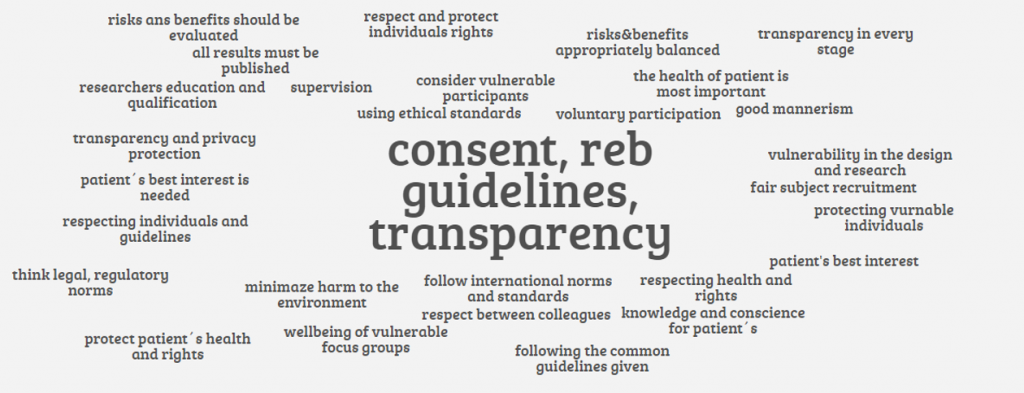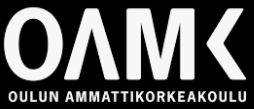Methods of Research and Knowledge Production is a 10 ETCS course module for OUAS international Master’s Degree in Clinical Optometry students. The course is taught in English. This course begins in August as the program’s first module and lasts until the end of May. The didactic portion of this course is offered via remote lectures and meetings. Materials are available for students in the electronic teaching and learning Moodle environment. Hybrid-model teaching and learning are also utilized for performing two on-campus workshop days. Some students are remotely present from their homes, while others can be present at our campus on the workshop days.

The participating students already have basic knowledge of research methods based on earlier Bachelor’s degree studies. However, during this course, they deepen their understanding of research methods and scientific skills by reading and systematically searching for research articles, evaluating articles as well as communicating with each other.
After this, the students produce recordings that are posted to Moodle. This allows other students an opportunity to provide constructive feedback and the presenter to respond to this feedback, enhancing the students’ evidenced-based skills. The students have five main assignments to submit during this course. Some assignments are individual, and some are done in groups of two to three students. The goal of this course is to enhance the students’ scientific writing and presentation skills. [1]
Remember always to use evidence-based knowledge
The students receive remote lectures on evidence-based knowledge and research, qualitative research, quantitative research, and biostatistics. At the beginning of the course, they learn what evidence-based research is, and their first assignment is to find systematic reviews on the research field that interests them. Secondly, they must evaluate research articles with specific appraisal tools [2] [3].
Thirdly, students conduct qualitative and quantitative analysis and practice scientific writing in the given assignments. In addition, the students are given a lecture by an information specialist from Oulu University Library on useful databases, source criticism, and how to systematically search for scientific, scholarly information.
The students are also informed about the library’s Book a Librarian service, which allows students to book an appointment with a library information specialist if they need further help with systematic searching or using different databases. This service is provided at the campus as well as remotely. The Head of the Master’s Degree in Clinical Optometry program also introduces different innovative research projects offered by optometry staff of the OUAS.
Use real patient data and learn to use SPSS software
The two-day hybrid-model workshops take place in November. During the first workshop day, the students learn to use databases properly and manage their references with the help of Mendeley, a reference management software. Mendeley is used to save research articles and help researchers refer to these articles while writing their scientific text. In addition, students learn how to conduct a qualitative analysis by analyzing real-life, public internet diaries on the life of people who are either blind, weak-sighted or going through vision loss. The analyses are done in groups of two to three students allowing discussions about results found in the research articles.
Principles of ethical research in the hospital environment-related research are also taught. During the first workshop day, students read together articles related to ethical considerations. After this, they put together an AnswerGarden table of important perspectives of ethics (Figure 1).

During the second workshop day, students learn to conduct a quantitative analysis with actual patient data using SPSS software. They start by answering the questionnaire themselves from which the data was gathered. After this, they use SPSS to analyze the data with the help of the course’s principal teacher.
The final assignment is done at the end of this course. This consists of writing a research plan for their Master’s thesis. This includes describing critical research project components, including methods, thesis topic, timetable, and budget. In addition, the students read each other’s research plans and give feedback to each other. At this point, the students are expected to complete their work using scientific writing.
Work as a scientific researcher in the future
Why is it important to learn research methods and deepen one’s knowledge on scientific skills? The vast majority of the Master’s Degree in Clinical Optometry program’s studies are clinically oriented. However, the Methods of Research and Knowledge Production course is vital for the program, since it expands the students’ scientific skills gained during their previous Bachelor’s degree studies, providing them the ability to work as a scientific researcher.
The skills learned during the course also enhance eye care providers’ clinical decision-making skills and aid them in making evidenced-based management decisions. In addition, OUAS Master’s degree programmes are on the EQF (European Quality Framework) level 7. This allows OUAS Master’s graduates to apply to doctoral programs.
Rantala Arja, principal lecturer
Oulu University of Applied Sciences, Health and Social Care
Andersson Robert, principal lecturer
Oulu University of Applied Sciences, Specialty Fields in Healthcare
Sormunen-Harvey Merja, senior information specialist
Oulu University Library, Health and Social Care Library
References
[1] Oulu University of Applied Sciences. 2022. Master’s degree in Health Care, Clinical Optometry (MOptom). Hakupäivä 21.1.2022. https://www.oamk.fi/en/study-at-oamk/master-s-degrees/degree-programme-in-clinical-optometry
[2] The University of Adelaide. 2022. JBI’s critical appraisal tools assist in assessing the trustworthiness, relevance, and results of published papers. Hakupäivä 22.1.2022. https://jbi.global/critical-appraisal-tools
[3] University of Oxford. 2022. Critical Appraisal tool. Hakupäivä 21.1.2022. https://www.cebm.ox.ac.uk/resources/ebm-tools/critical-appraisal-tools

Vastaa
Sinun täytyy kirjautua sisään kommentoidaksesi.